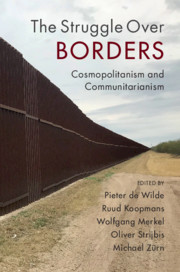Book contents
- The Struggle Over Borders
- The Struggle over Borders
- Copyright page
- Contents
- Figures
- Tables
- Contributors
- 1 Cosmopolitanism and Communitarianism – How Globalization Is Reshaping Politics in the Twenty-First Century
- Part I Domestic Impacts
- Part II Supranational and Cross-Level Analyses
- 5 Who Is the Most Frequent Traveller? The Cosmopolitanism of National, European and Global Elites
- 6 Globalization Conflict in International Assemblies: Cleavage Formation beyond the State?
- 7 Who Are the Cosmopolitans and the Communitarians? Claims-Making across Issues, Polity Levels and Countries
- Part III Conclusion
- Appendices
- References
- Index
6 - Globalization Conflict in International Assemblies: Cleavage Formation beyond the State?
from Part II - Supranational and Cross-Level Analyses
Published online by Cambridge University Press: 28 June 2019
- The Struggle Over Borders
- The Struggle over Borders
- Copyright page
- Contents
- Figures
- Tables
- Contributors
- 1 Cosmopolitanism and Communitarianism – How Globalization Is Reshaping Politics in the Twenty-First Century
- Part I Domestic Impacts
- Part II Supranational and Cross-Level Analyses
- 5 Who Is the Most Frequent Traveller? The Cosmopolitanism of National, European and Global Elites
- 6 Globalization Conflict in International Assemblies: Cleavage Formation beyond the State?
- 7 Who Are the Cosmopolitans and the Communitarians? Claims-Making across Issues, Polity Levels and Countries
- Part III Conclusion
- Appendices
- References
- Index
Summary
analyzes globalization-related conflict in the UNGA and the European Parliament. These two ‘strong publics’ feature debates on issues related to the permeability of borders and are directly tied to important centers of decision-making in global governance. The findings show a powerful cosmopolitan presence in both assemblies. The EP also features more communitarian counter voices. An indepth analysis of the partisan nature of debate in the EP and the difference between directly elected Members of the EP and appointed European Commissioners lends strength to the hypothesis that electoral accountability strengthens the presence of communitarian voice in supranational arenas. Direct elections and proportional representation appears to increase the presence of communitarians in global governance. This finding implies that cosmopolitan democrats face a difficult trade-off. They can democratize global governance, but it will likely come at the price of less cosmopolitan policies made in international institutions. Alternatively, they can pursue cosmopolitan policies, but only if they limit the democratic accountability of key global governance institutions.
Keywords
- Type
- Chapter
- Information
- The Struggle Over BordersCosmopolitanism and Communitarianism, pp. 144 - 172Publisher: Cambridge University PressPrint publication year: 2019
- 1
- Cited by

